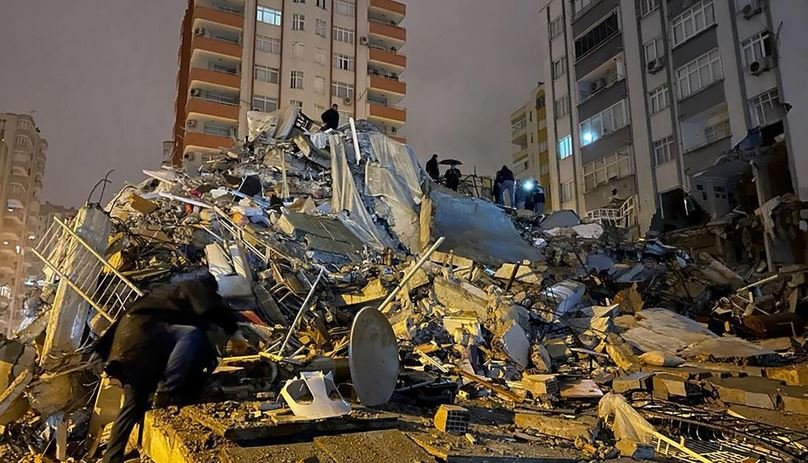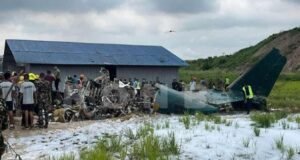
More than 1,500 people have died and rescuers are racing to pull survivors from beneath the rubble after a devastating earthquake ripped through Turkey and Syria, leaving destruction and debris on each side of the border.
One of the strongest earthquakes to hit the region in a century shook residents from their beds at around 4 am on Monday, sending tremors as far away as Lebanon and Israel, CNN reports.
In Turkey, at least 1,014 people have died and several thousand are injured, according to the country’s Disaster and Emergency Management Agency (AFAD).
In neighboring Syria, at least 592 people have died, including 371 mostly in the regions of Aleppo, Hama, Latakia and Tartus, according to Syrian state news agency SANA, which also reported 1,089 injuries.
The “White Helmets” group, officially known as the Syria Civil Defense, also reported at least 221 deaths and 419 injuries in opposition-controlled areas of northwestern Syria. Much of northwestern Syria, which borders Turkey, is controlled by anti-government forces amid a bloody civil war that began in 2011.
The epicentre of the 7.8-magnitude quake was 23 kilometers (14.2 miles) east of Nurdagi, in Turkey’s Gaziantep province, at a depth of 24.1 kilometers (14.9 miles), the United States Geological Survey (USGS) said.
Around nine hours later, a major aftershock that measured 7.5 in magnitude struck in Turkey, according to the USGS. That shock hit around 95 kilometers (59 miles) north of the original quake.
Video from the scene in Turkey showed day breaking over rows of collapsed buildings, some with apartments exposed to the elements as people huddled in the freezing cold beside them, waiting for help.
Monday’s quake is believed to be the strongest to hit Turkey since 1939, when an earthquake of the same magnitude killed 30,000 people, according to the USGS. Earthquakes of this magnitude are rare, with fewer than five occurring each year on average, anywhere in the world. Seven quakes with magnitude 7.0 or greater have struck Turkey in the past 25 years – but Monday’s is the most powerful.
Karl Lang, an assistant professor at Georgia Tech University’s School of Earth and Atmospheric Sciences, told CNN the area hit by the quake Monday is prone to seismic activity. “It’s a very large fault zone, but this is a larger earthquake than they’ve experienced any time in recent memory,” Lang said.
It felt like it would never be over’
Journalist Eyad Kourdi, who lives in Gaziantep and was staying with his parents when the earthquake struck early Monday, said “it felt like it would never be over.”
When the shaking stopped, Kourdi and his parents walked out of their home still wearing their pajamas, he said.
With several inches of snow on the ground, they waited outside in the rain for about 30 minutes before he could go back inside to grab coats and boots.
Strong aftershocks have been felt in southern and central Turkey. About 11 minutes after the main quake hit, the strongest aftershock of 6.7 magnitude hit about 32 kilometers (20 miles) northwest of the main quake’s epicenter. Another intense aftershock with a magnitude of 5.6 then occurred 19 minutes after the main quake.
Kourdi said there were up to eight “very strong” aftershocks in under a minute after the 7.8 magnitude quake struck, causing belongings in his home to fall to the ground. Many of his neighbors had left their homes following the quake, he said.
Photos showing the true scale of the disaster emerged as day broke in Turkey. Entire buildings have been flattened, with metal rods scattered across the streets. Cars have toppled over, while bulldozers work to clear the debris.
Gaziantep Castle has been heavily damaged in the powerful quake.
A winter storm in the region is exacerbating the disaster, according to CNN meteorologists.
“Hundreds of thousands of people are impacted by this. It is cold. It is rainy. Roads could be impacted, that means your food, your livelihood, the care for your children, the care for your family,” CNN meteorologist Karen Maginnis said.
“Anything as far as crops or anything growing across this region will be impacted as well. The ramifications of this are broad and will impact this region for weeks, and months.”
Searching for survivors
Search and rescue teams have been dispatched to the south of the country, Turkey’s interior minister, Suleyman Soylu, said. AFAD, the disaster agency, said it had requested international help through the Emergency Response Coordination Centre (ERCC), the European Union’s humanitarian program.
Nearly 1,000 search and rescue volunteers have been deployed from Turkey’s largest city, Istanbul, along with dogs, trucks and aid, according to its governor, Ali Yerlikaya.
The World Health Organization has activated its network of emergency medical teams in the two countries to assist those affected by the earthquake, the organization’s director-general tweeted. Erdogan also said in his televised address that NATO, the European Union and dozens of other countries had offered to help.
The governor of Gaziantep, Davut Gul, said on Twitter that “the earthquake was felt strongly in our city,” and advised the public to wait outside their homes and stay calm.
“Please let’s wait outside without panic. Let’s not use our cars. Let’s not crowd the main roads. Let’s not keep the phones busy,” he said.
Gaziantep province has a number of small- and medium-sized cities, with a sizable refugee population, according to Brookings Institute fellow Asli Aydintasbas.
“Some of these areas are rather poor. Some are more richer, urban areas … but other parts that we’re talking about that seem to have been devastated, are relatively lower income areas,” she said.
Video from the city of Diyarbakir, to the northeast of Gaziantep, shows rescue workers frantically trying to pull survivors out of the rubble.
Erdogan said the quake was felt in many parts of the country.
“I convey my best wishes to all our citizens who were affected by the earthquake that occurred in Kahramanmaraş and was felt in many parts of our country. All our relevant units are on alert under the coordination of AFAD,” Erdogan wrote on Twitter.
Messages of condolences and support started pouring in Monday morning as world leaders woke to the news of the deadly earthquake.
White House National Security Adviser Jake Sullivan said the United States was “profoundly concerned” about the destruction in Syria and Turkey.
“I have been in touch with Turkish officials to relay that we stand ready to provide any & all needed assistance. We will continue to closely monitor the situation in coordination with Turkiye,” Sullivan wrote on Twitter.
 Weekly Bangla Mirror | Bangla Mirror, Bangladeshi news in UK, bangla mirror news
Weekly Bangla Mirror | Bangla Mirror, Bangladeshi news in UK, bangla mirror news







